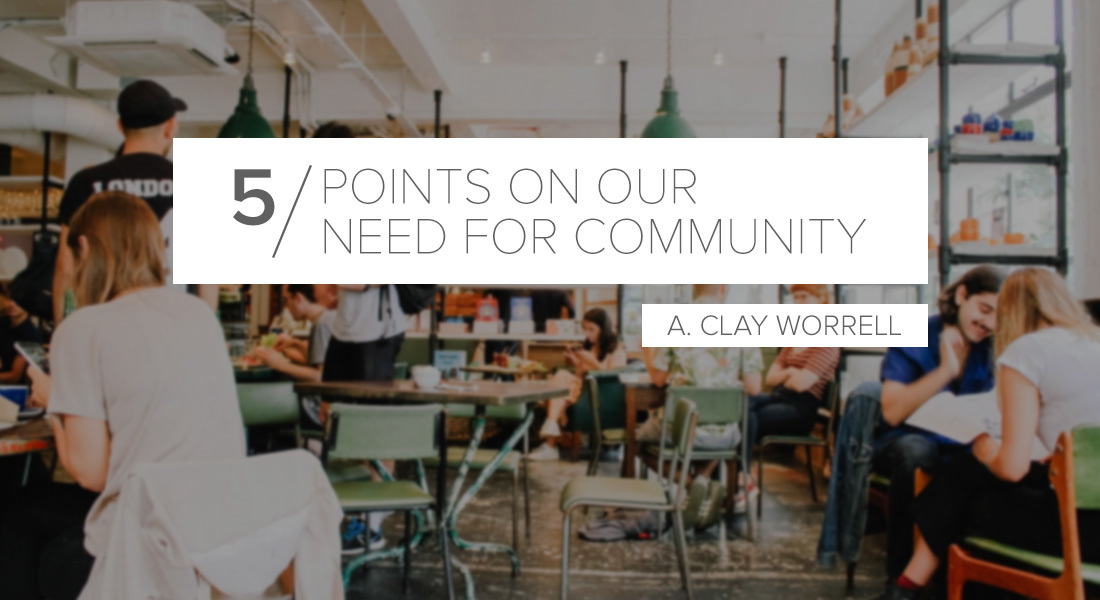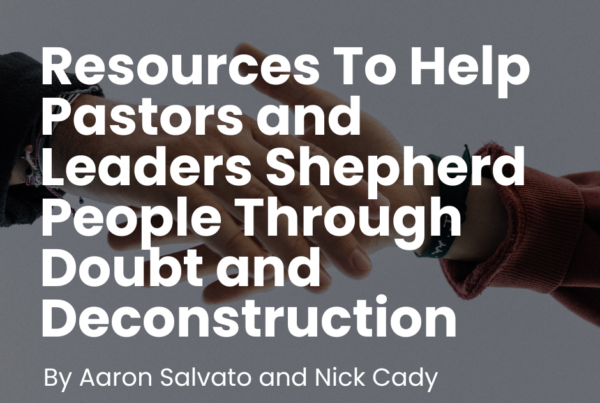
It is an interesting time that we live in. People are more connected than they have ever been yet more isolated than ever as well. We literally have thousands of “friends” in our pockets whom many of us interact with on a daily basis. Yet the depth of our relationships are exceedingly shallow. As I was thinking through this, I had a visual of social media as an ocean vast as the Pacific but an inch deep. It may look impressive from a distance, but no matter how far you wade in, you will not find depth of any kind.
I recently read a couple articles about the correlation between social media and isolation, one was by NPR and the other from Psychology Today. Both articles were pointing out the vicious cycle of isolation and anxiety, saying isolation produces anxiety and depression, then anxiety and depression cause people to isolate farther. This is a destructive circle we can get in, and contrary to what one might think, these articles showed that social media not only does not help, but fuels this cycle.
The article in Psychology Today said this:
“The relatively modern phenomenon of social media and its associated technology adds a new dimension to loneliness and anxiety by offering the young person a way of directly quantifying friendships, viewing the friendship networks of others for comparison, and providing immediate information about social events. You can compare your own popularity with that of your peers, and manage that adolescent ‘fear of missing out’ (FOMO) by continually monitoring what’s going on socially. So it’s easy to see how technology use can take the place of more traditional social interaction and provide a yardstick for one’s popularity – or more significantly, one’s feelings of loneliness and alienation.”
The NPR article references a study from the American Journal of Preventive Medicine that showed that people who visited social media outlets more frequently (58 or more times per week) had more than three times the odds of perceived social isolation than those who visited less than nine times per week. They hypothesize the cause as follows: “You might watch all these interactions where it seems like everyone else is connecting…That could lead to feeling excluded. The images of other people’s seemingly perfect vacations, homes and lives, even though those are not likely to represent reality, can make you feel like you’re missing out.”
So, we are living in the middle of this tech era, ruled and governed by social media outlets of various descriptions, who are all promising friendship and community, but are bearing the bad fruit of isolation, anxiety and depression.
However the reality is, social media is not ultimately at fault, and social media is not evil. The true problem is so much deeper, and it is not new; I would like to make the case that you can trace it all the way back to the beginning of humanity, and then I want to show that Jesus is the only solution!
So I have five points that I hope will provide some clarity on this subject of our need for and struggle with community.
1. Community is in God’s very nature.
2. We were created FOR community.
3. Sin broke (and breaks) community.
4. Jesus redeems us TO community.
5. The Church IS community.
1. Community is in God’s very nature.
The God of the Bible is a Triune God. He reveals Himself as such from the start. Genesis 1:26 says, “Then God said, ‘Let us make man in our image, after our likeness…'” As The New City Catechism so eloquently states in questions two & three:
“Q: What is God? A: God is the creator and sustainer of everyone and everything. He is eternal, infinite, and unchangeable in his power and perfection, goodness and glory, wisdom, justice, and truth. Nothing happens except through him and by his will. Q: How many persons are there in God? A: There are three persons in the one true and living God: the Father, the Son, and the Holy Spirit. They are the same in substance, equal in power and glory.”
The implications of God’s Triune nature are vast, one of the most significant of which is that it means God Himself not only is in community, but that He Himself IS community. God, in His very nature is a loving community from eternity past. And from that communal nature, He created us, His image bearers, as communal beings. Which brings us to our next point.
2. We were created FOR community.
God is a community of love, and He created us to live in loving community. In Genesis 2:18 we see a glimpse into the mind of God as He was creating humanity: “Then the LORD God said, ‘It is not good that the man should be alone; I will make him a helper fit for him.'” This is why isolation is damaging, as the studies I referenced show, isolation produce anxiety and depression, because it is not good that man should be alone! Community is our created intent, so when we are not living in it, we do not thrive. The nature of the community God created us for is twofold. It is 1) Loving (as I mentioned) and 2) Shares purpose or mission.
God’s design for community is that we would live in loving harmony with Him and with one another. Serving and obeying God, while preferring and complementing (completing) one another. Additionally, God’s community has, from the start, always revolved around shared purpose or mission. In Genesis 1 we see that God called our first parents not just to be fruitful and multiply, but also to subdue the earth, have dominion over the creatures and tend to the garden. If our first parents would have walked in this, humanity would live in paradise and harmony! But you know the story. Genesis 3 comes along and everything starts to fall apart. Our first parents sinned against God and against one another. Hence point number three.
3. Sin broke (and breaks) community.
In Genesis 3, the account of the fall, we see a systematic deconstruction of our created intent: The Serpent arrived and called the command of God into question, and our first parents began to doubt, or disbelieve, God’s word, which led them to betray their mission. Rather than caring for creation, they abused it, using it for their own selfish gain (eating of the tree of the knowledge of good and evil).
Their disbelief and their rejection of their purpose caused the community they were created for to begin to break down. They rebelled against God, which broke communion with Him. Rather than walking with Him, they hid themselves from Him out of shame. Then rather than loving and preferring one another, they turned on one another! The man blaming the woman for their rebellion (shocking, I know).
From that point on, as we read through the grand narrative of scripture, and of history for that matter, we see this pattern over and over: Community broken by sin. Sin breaks community because, as I mentioned, in order for community to work, its foundation must be love.
But sin, at it’s core, is selfish, and selfishness is the antithesis of love. We could talk about this on a large scale, in reference to nations waring against nations, or political parties, or social and racial conflict. All of which are examples of community that is broken by sin.
But let’s bring it a bit closer to our personal lives. Returning to what I mentioned in the start of this article. In this age we live in, we are increasingly isolated because the spirit of our culture is individualism, independence and success, where the end of all is being successful, wealthy, powerful and glamorous. The narrative we are fed is watch out for “#1.” Do whatever it takes to succeed, love yourself, work yourself to the bone to advance your career because it’s a dog-eat-dog world. It is this godless philosophy that drives us away from true community. We are so “busy” with our own lives that we do not make time for real community. But we have this pseudo community that is social media, which gives us the illusion of friendship but with no real personal investment, no sacrifice and no love. And as I said in the start, we are beginning to see the fruit of this broken system.
This is the great tragedy of our existence, the struggle between our God-given need for community and our inherited sin nature that rules us apart from Christ. So what is the answer? JESUS.
4. Jesus redeems us TO community.
If the problem goes all the way back to creation, sin breaking communion with God and community with one another, then the solution needs to resolve the root of the problem, not just the symptoms. Queue Jesus.
Romans 5:12-16 shows us that Jesus came to this earth to undo the work of Adam, our first father. Jesus, as He walked on this earth, was the first man who ever fully and perfectly lived out our created intent. He had unbroken communion with the Father; He did not rebel against Him. He selflessly loved those around Him. He fulfilled the mission and purpose of God without wavering. And finally, Jesus gave Himself up freely to the cross to pay the penalty for our sin; He went to the grave and was raised by the power of God, victorious over sin and death once and for all. So now, as you and I place our faith in Him, we share His identity and are freed from the power of sin in our lives. Through the work of Jesus, God restored our communion with Him by breaking down the barrier of sin, freeing us from the prison of our destructive selfishness, so we can love Him. And consequently, He saved us TO a redeemed community as He adopted us into the family of God. See Romans 8:14-17.
In short, by the grace of Jesus we are set free to walk in our created intent. Though we will not do it perfectly, in Christ we are able to live in communion with God, community with one another, fulfilling the mission and purpose of God in our lives. This is what it means to be part of the Church.
5. Church IS community.
When we understand the Gospel in this light, it changes the way we see church. Church is not something we do on Sundays; it is certainly not a building. Church is the community of God’s people who commune with God together and share HIS mission.
We see this lived out in the snapshot of the early church in Acts 2:42-47. For them church was not a once or twice a week thing, it was day by day meeting in the temple and in one another’s homes. They were receiving teaching. They were fellowshipping. They broke bread. They prayed. They had all things in common, sacrificially giving to one another. They praised God and had favor with all the people, and God added to their number day by day those who were being saved. This type of community is hard; it takes sacrifice and time. It takes a shifting of priorities. But this is what it means to be a part of Christ’s church. This is the very thing Jesus commands us to do.
” A new commandment I give to you, that you love one another: just as I have loved you, you also are to love one another. By this all people will know that you are my disciples, if you have love for one another” (John 13:34-35).









